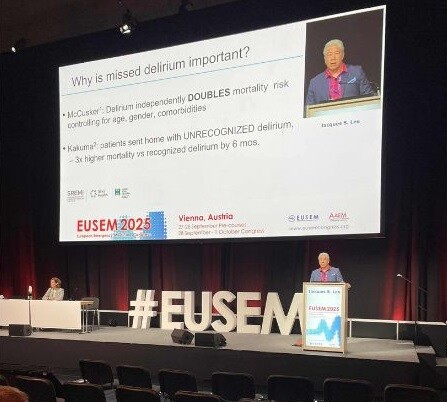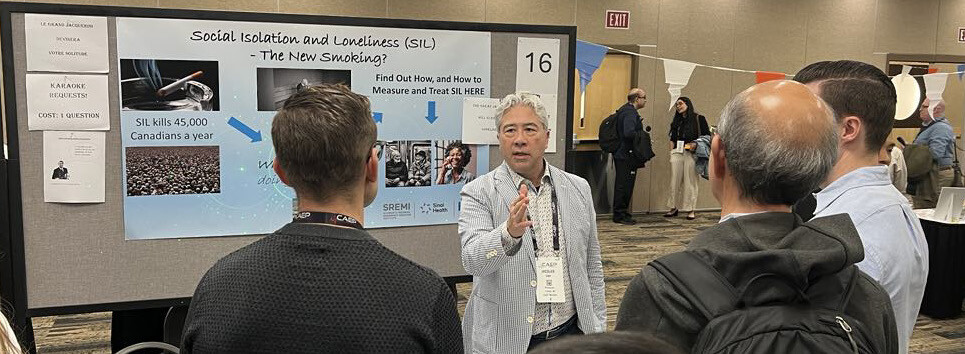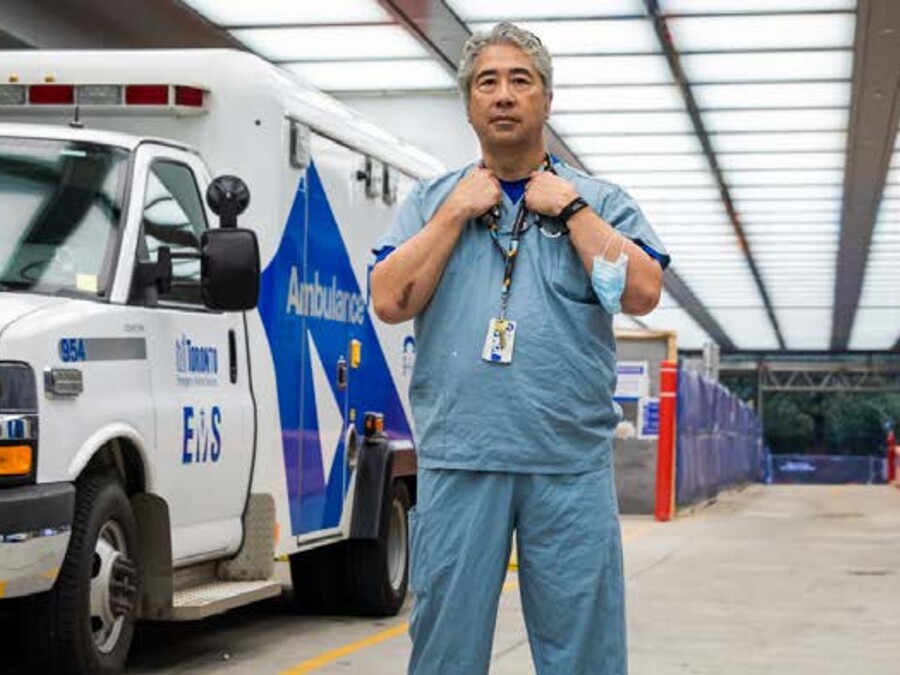Main Second Level Navigation
Breadcrumbs
- Home
- Research
- SREMI Research Chair | Dr. Lee
SREMI Research Chair
Dr. Jacques Lee

SREMI’s generous support made 2025 an exceptional year for Dr. Jacques Lee and the Geriatric Emergency Medicine Research Program. His team continues to lead groundbreaking work on delirium, social isolation, and loneliness among older adults, issues that profoundly influence emergency care, recovery, and quality of life. Through innovative studies and mentorship, Dr. Lee’s program is improving the understanding and treatment of some of the most common and challenging conditions faced by older patients in the emergency department (ED).
Understanding and Treating Delirium in the Emergency Department
The Femoral Fractures – Identifying Incident Delirium Using Urine Metabolomics (FIND_UM) study is addressing a centuries-old mystery: what chemical changes occur in the body when someone becomes delirious? This multicentre collaboration among SREMI, Sunnybrook Health Sciences Centre, the University of Ottawa, Laval University, and McMaster University has already enrolled more than 190 older adults hospitalized with hip fractures, a population in which up to 30% develop delirium within a week of admission. By analyzing urine samples to identify which chemicals are excreted during delirium, the team hopes to uncover the biological processes that underlie this common but poorly understood condition. These insights could pave the way for earlier detection tools, new biomarkers, and novel drug treatments to prevent or even cure delirium. Ultimately, FIND_UM has the potential to transform how delirium is diagnosed and managed in hospitals and emergency departments around the world.
Recognizing Delirium in the ED
Delirium often goes unnoticed in the fast-paced environment of the ED, a major barrier to improving care. Subtle or fluctuating symptoms make it easy to miss, especially during busy shifts. As a result, up to 80% of delirium cases in older adults are unrecognized, leading to missed opportunities for timely treatment and safer discharge.
To address this challenge, Dr. Lee’s team recently received a $464,966, two-year Innovation Fund grant, awarded through a joint initiative of the Ontario Ministry of Health and the Ontario Medical Association. The Better ED Delirium Recognition (BEDDeR) project, co-led with Dr. Lauren Lapointe-Shaw from the University Health Network, will enroll more than 700 older adults across two hospital sites. Using a gold-standard assessment for delirium, the project will evaluate how often ED clinicians correctly identify delirium and explore practical interventions to enhance recognition. These include testing a tablet-based screening game designed to detect cognitive changes and examining whether specially trained volunteers can support ED staff in identifying at-risk patients. Findings from the BEDDeR project are expected to directly improve patient safety and quality of care. By strengthening frontline clinicians’ ability to recognize delirium, the project will help ensure that fewer patients are discharged without the evaluation and support they need.
Addressing Social Isolation and Loneliness (SIL)
Dr. Lee also leads the HOW-RU (HOspitals WoRking in Unison) study, which seeks to reduce loneliness among older adults through weekly volunteer phone or video calls. Featured on Global News, this compassionate and innovative program has recruited and trained more than 50 volunteers, who have already connected with over 140 patients in meaningful weekly conversations. Loneliness and social isolation are often overlooked in hospital settings, yet they are known to have serious impacts on both mental and physical health, comparable to the effects of smoking or obesity. HOW-RU represents a low-cost, scalable model of care that transforms volunteer engagement into measurable health benefits, reminding us that human connection remains one of the most powerful interventions in medicine.
Expanding Access: The FRIENDS / AMICAL Study
In collaboration with Dr. Sabrina Kolker (Mount Sinai Hospital), Dr. Mireille Norris (Sunnybrook/University of Toronto), and Mia Hubert (University of Toronto), the FRIENDS/AMICAL study adapts the HOW-RU intervention for Francophone older adults living in the Greater Toronto Area. By expanding access to social support in French, the team aims to promote equity in care and ensure that language is never a barrier to connection or compassion.
International Collaboration and Mentorship
Dr. Ana Garcia – International Fellow
In Spain, patients visiting an ED are often cared for by specialists in internal medicine or surgery. Dr. Ana Garcia is one such internal medicine physician who works exclusively in the ED. Recently, she was appointed to lead the development of a new center dedicated to the care of older adults. To support this initiative, Dr. Garcia reached out to SREMI. Under the supervision of Dr. Jacques Lee, she spent three months learning about SREMI’s leading practices in Geriatric Emergency Medicine and exploring how these could be adapted for implementation at Clinic Barcelona in Spain.
CAEP Special Merit Award
Dr. Lee was the recipient of the 2025 Canadian Association of Emergency Physicians Special Merit Award for his exceptional contributions to emergency medicine in Canada and his leadership of the Code Cycle campaign, an initiative that saw emergency physicians cycle over 500 km from Toronto to Montreal en route to the ICEM2025 conference. Braving cold, rainy weather, the team raised $12,000 for the Emergency Medicine Advancement Fund to support vital research improving emergency care for all Canadians.




Training the Next Generation of Leaders
Sara Corvinelli is a second year PhD student with the Institute of Medical Science at the University of Toronto. Her thesis, supervised by Dr. Jacques Lee, explores innovative strategies to improve delirium recognition in the ED, specifically the use of specialized volunteers and a brief screening tool. Over the last year, she has been developing the protocol for the multi-centre BEDDeR (Better ED Delirium Recognition) study and is conducting a systematic review on user-friendly delirium screening tools for non-clinicians. Sara received a QEII-GSST award in support of her doctoral research. Alongside her research in GEM, she is pursuing a specialization in aging and the life course, focusing on qualitative research in older populations. She is committed to improving care for older adults through research and volunteering with MAUVE-ED at Sinai Health.
Dr. Shari Li is a SREMI GEM research fellow based remotely at Vancouver General Hospital in BC, focusing on goals of care discussions in the emergency department. During her fellowship this year, she has undertaken two literature reviews and a large retrospective cohort study examining goals of care among ED patients. She is also developing the protocol and leading ethics work for a mixed-methods pilot study on goals of care for acutely ill older adults in the ED. In addition, Dr. Li applies her expertise in knowledge synthesis to lead a systematic review for SREMI, contributing to evidence-informed emergency medicine practice.
Simran Lohit is a third-year medical student from the University of Toronto. She worked with Dr. Jacques Lee on a single-item validation trial for an instrument measuring social isolation and loneliness (SIL) in older patients. Over the summer, Simran organized data-collection procedures, trained a team of research volunteers, and conducted one-on-one telephone interviews to validate a single-item tool used to quickly screen for SIL for emergency department patients. In addition to this, she gained exposure assisting on systematic reviews that SREMI is conducting. Simran’s experience with SREMI provided the opportunity to gain mentorship from emergency physicians and researchers, exposure to international conferences, and gain valuable research experience while engaging in the Toronto community.
International Collaboration & Mentorship
The SREMI Research Chair has allowed Dr. Lee to serve as a global resource to foster research in older people needing ED care. With mentees and collaborators in Australia, the US, Ireland, Singapore and Ethiopia, Dr. Lee is guiding new investigators to help develop important and feasible research projects that will have local and global impact.



